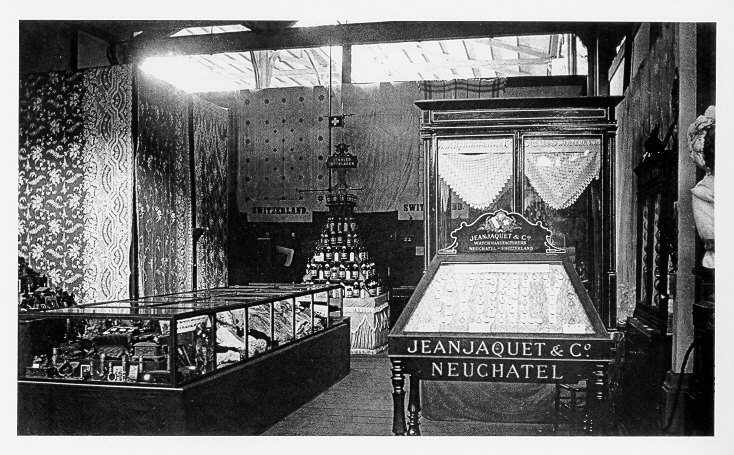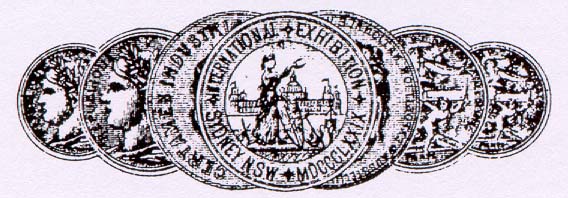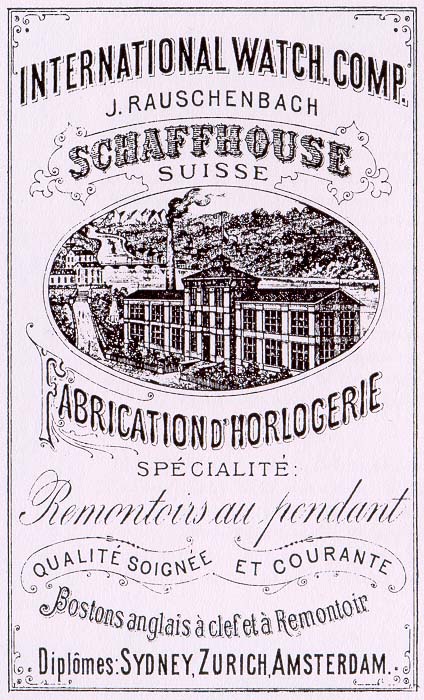The Sydney International Exhibition of 1879 was held under the
supervision of the Agricultural Society of New South Wales and followed
the “Exposition Universelle” in Paris in 1878. Sydney is also the first
exhibition in which the International Watch Company is known to have
taken part.
“Adjoining the Italian Court one bay was allotted to Switzerland,
where
there was a creditable display of watches, wood carvings and laces”
(Report
of the Executive Commissioner pp 1xxx)

We can see in the above plate the word "SYDNEY" outlined using pocket
watches in the display by Jeanjaquet & Co.
Switzerland had a total of sixteen exhibits and was represented by
Ernest Eugster, Esq, as agent. Not all of these exhibits were watches
and only three watch exhibitors put their products forward for
examination by the judges.
American Watch Co., Watham, U.S.A. - Watches and Chronographs.
Victor Kullberg, London, England - Watches and Chronographs.
Nicole & Nielsen, London, England - Watches and Chronographs,
&c.
T. Russell & Sons, London, England - Watches and Chronographs,
&c.
Castelberg & Co., London, England - Watches and Chronographs,
&c.
F. Bachschmid, Switzerland – Watches.
F. Allerding & Sons, Sydney, Australia - Tools, &c.
Wurtemberg Clock Factory, Schwenningen, Germany - Watchman’s and
Railway
Control Clocks.
A. Lange and Sons, Dresden, Germany - Watches, &c.
L. Audemars, Brassus, Switzerland - Watches, &c.
A. H. Rodanet, Paris, France – Chronometers.
G. Tribaudeau, Besancon, France – Watches.
International Watch Company, Switzerland - Watches.
The judges final verdict with the exhibitors and the judging
criteria
can be seen in the following table:
| Exhibitor | Originality | Invention and discovery | Utility and quality of material | Skill in workmanship | Fitness for purpose intended | Adaptation of public wants | Economy | Cost | Finish and elegance of cases | Time-keeping qualities | Total |
| American Watch Co |
|
|
|
|
|
|
|
|
|
|
|
| Victor Kullberg |
|
|
|
|
|
|
|
|
|
|
|
| Nicole & Nielsen |
|
|
|
|
|
|
|
|
|
|
|
| T. Russel & Son |
|
|
|
|
|
|
|
|
|
|
|
| Castelberg & Co |
|
|
|
|
|
|
|
|
|
|
|
| F. Bachschmid |
|
|
|
|
|
|
|
|
|
|
|
| A. Lange & Sons |
|
|
|
|
|
|
|
|
|
|
|
| Louis Audemars |
|
|
|
|
|
|
|
|
|
|
|
| G. Tribaudeau |
|
|
|
|
|
|
|
|
|
|
|
| International Watch Co. |
|
|
|
|
|
|
|
|
|
|
|
Two exhibitors, F. Bachschmid and The International Watch Company did not submit their watches to the separate time-keeping trial at the Sydney Observatory.
The International Watch Company in summary “exhibits a collection of
watches of the third order of merit, and adjudged a “Commended” award
(Official Record of the Sydney Exhibition of 1879 pp 407). Castelberg
& Co. who rated one point more than IWC submitted their watches for
the time-keeping trial (scoring 53/100) and received a "Highly
Commended" award. IWC would probably have rated higher had they
submitted their watches for the time-keeping trial.

From IWC-Uhren page 47
The financial report for the period 1st November 1876 to the 31st July 1877 states, “…In order to bring the business onto a sound footing with regard to the sale of goods, our manager deemed it necessary to depart from the principles followed by the former company. As you are aware, only one type of watch was manufactured in various qualities earlier and sales were effected exclusively in North America; a practice which may have advantages under normal business conditions, but which must have serious consequences in times of crisis. In recognition of this situation, Mr Seeland endeavoured to equip the factory in such a manner that watches of various types could be produced and the tastes of the various countries could be fulfilled …” And further, “…As far as sales of the new watches are concerned, it is our objective to enter the English as well as the American market …” (Tolke & King pp 61)
Exhibiting in Sydney in 1879, was a very good chance to increase the sales of the new calibre to the world market. The Australian Colonies at that time as you would expect had a very strong British influence and the exhibition of the Seeland calibre, with its full plate for the English market was probably the main focus for IWC. That is not to say that the "Jones Calibre" was not exhibited but that the "Seeland Calibre" was probably the main focus. We will never know which watches were exhibited because they disappeared. There are two conflicting accounts; “Also the valuable collection at the World Exhibition in Sydney was lost as a result of the embezzlement of the Swiss agent in Australia ” (Tolke & King pp 41) and “We know from U. Haenggi that the collection exhibited at Sydney was later lost as a result of confiscation, presumably in connection with the bankruptcy in the same year” (Tolke & King pp 70). From an Australian perspective it would be nice to think that the watches are still in Australia waiting to be rediscovered.
IWC did not participate in the Melbourne International Exhibition of 1880 either on its own or part of the collective exhibition by thirty-two Swiss watchmakers.
With the takeover by of IWC by Johann Rauschenbach, exhibiting at
World Exhibitions recommenced at Amsterdam in 1883 and the awards
gathered were used to further promote the company.

The Sydney International Exhibition of 1879 was the initial showing by the International Watch Company, and it continues to do so annually at events such a Basel up until the year 2001 and at the Geneva Watch Show in future.
I’d like to thank the State Library of Victoria for access to the records of both the Sydney Exhibition of 1879 and the Melbourne Exhibition of 1880.
Greg Steer - August 2001

Melbourne International Exhibition 1880: “The Official Catalogue of the Exhibits with Introductory Notices of the Countries Exhibiting”, Melbourne, Mason, Firth & M’Cutcheon, General Printers, 1880.
"Notes on the Sydney International Exhibition of 1879": Sydney, Thomas Richards, Government Printer, 1880.
"Official Record of the Sydney Exhibition of 1879": Sydney, Thomas Richards, Government Printer, 1881.
"IWC International Watch CO". Schaffhausen, Hans Tolke and Jürgen King, Verlag Ineichen, Zurich, 1987.
Copyright © 2001 Greg Steer